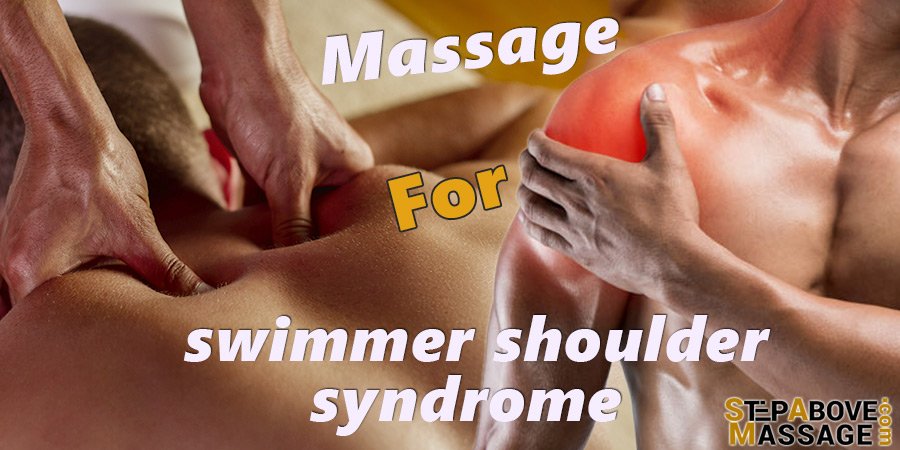One of the complications in athletes’ shoulders, especially in people who throw or hit with high intensities in the shoulder joint, is the swimmer’s shoulder such as tendons and their bursae. In Raleigh, NC we see a lot of clients with shoulder pain. In this complication, bursae and tendons in restricted shoulder space become entangled or impinged. It’s time to examine the impingement and swimmer shoulder syndrome reasons and find the best treatment for them.
Shoulder pain (swimmer’s shoulder) greatly limits the ability to work, especially for people who do physical work with their arms and hands. About 20% of the population has experienced shoulder pain at least once, although only 50% of cases have shoulder pain improved within six months. Massage therapy can be an effective treatment for some types of shoulder injuries and pain.
What is shoulder impingement syndrome
Shoulder Impingement (swimmer’s shoulder) Syndrome is the result of chronic or frequent compression or entrapment of the cuff (rotator cuff) tendons in the shoulder, which can cause pain and problems in the shoulder. It can also be caused by a shoulder injury. People who do repetitive movements or constantly raise their arms at work, such as simple workers or athletes who move their arms frequently (such as weightlifters and ball throwers in baseball), are most at risk for shoulder trauma syndrome
Being in the wrong position can also play a role in causing this problem. If left untreated, shoulder involvement can lead to more serious problems such as a ruptured shoulder tendon (rotator cuff). Physiotherapists and physiotherapists can help reduce shoulder pain and improve shoulder movements and strength in people with shoulder dislocation syndrome.
What are the signs and symptoms of shoulder impingement syndrome
- Pain, especially when we raise our hands above our heads
- Shoulder muscle weakness disorder
- Inability to reach back
- Exacerbation of pain at night and during sleep
- In some people with more advanced symptoms, there may be a rupture in the tendons of the biceps and supraspinatus muscles.
Who is at risk for shoulder impingement syndrome
As we mentioned earlier, people with repetitive activities in sports such as volleyball, as well as the elderly who have deformed shoulder bones, and people with disorders caused by collisions and accidents can be exposed to swimmer shoulder syndrome. People who suffer from this complication do not report clear signs of the cause.
A cross-sectional study found that approximately 30% of the population over the age of 30 suffered from recurrent shoulder pain over the course of a month. 75% of people with this complication are usually over seventy years old and asymptomatic.
Usually, in people age 40 years and older who have repetitive movements, the pain is accompanied by a rupture in the tendons. But in people under 25, inflammation is more common. As mentioned, this complication is more common in people who perform repetitive movements of the upper arm and can occur in various sports such as:
- Swim
- baseball
- Tennis
- Throwing sports
- Gymnastics
- weightlifting
- Volleyball
- And even in cases such as painting.
Why swimmers need a massage
It is also common for a swimmer to adapt and change his or her movement pattern to relieve pain and muscle dysfunction. Athletes who have this problem often feel pain in the front and sides of the shoulder and muscles and in this area feel tired and weak.
Under these circumstances, it is almost impossible for a swimmer to perform swimming movements correctly. The swimmer often continues to compete with incorrect moves, and this can cause even more problems over time. Sometimes shoulder injuries may be mild, but sometimes they can cause major tissue damage that takes a long time to heal.
an appropriate sports massage before and after swimming competitions is also very useful. Before the swimming competition, a gentle and relaxing sports massage to warm up the muscles, increase blood circulation, and improve the elasticity of muscle tissues in order to be ready.
What are massage benefits for swimmers shoulder or shoulder impingement
first of all its good to say for swimmers shoulder pain we mainly focus on deeper massages like deep tissue so here are some of its benefits as below:
- Improves blood flow
- Facilitates recovery
- Reduces chronic muscle pain
- Increases flexibility and range of motion
- Relaxes muscles
- Reduces adhesions, swelling, and pain
- Improves functional wound tissue and restores muscle cohesion
- Reduces the risk of overwork injuries
- It warms and relaxes muscles and connective tissues
- Increases mental focus
What is deep-tissue massage significance
Deep tissue massage techniques can help increase flexibility, relaxation, and soften connective tissue as needed. Massage therapists can make suggestions on how to balance the body using stretching techniques and encourage basic self-care strategies. Regular exercise massage is just as important and helps swimmers manage the stress and anxiety caused by professional exercise.
If you are an athlete or you have constant shoulder cramps due to old age, Step Above Massage suggests deep tissue massage. Surely by receiving a suitable type of massage, such as deep tissue massage, you will have better performance and fewer muscle injuries. We provide you with the best massage therapy services in Raleigh at an affordable price.









